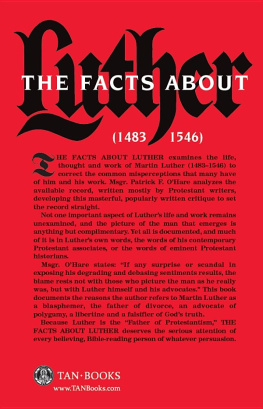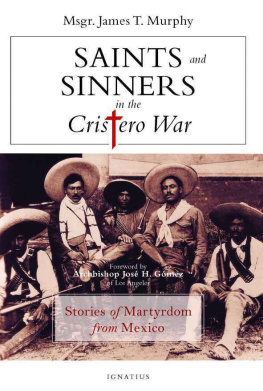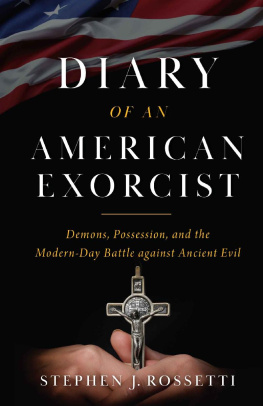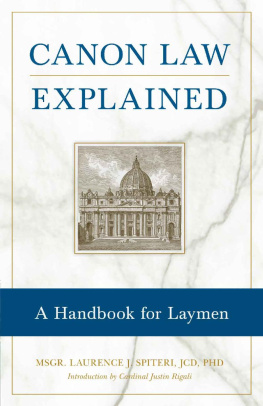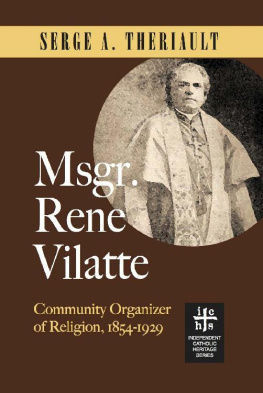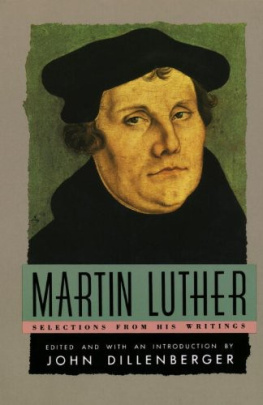Rev. Msgr. Patrick F. OHare - The Facts About Luther
Here you can read online Rev. Msgr. Patrick F. OHare - The Facts About Luther full text of the book (entire story) in english for free. Download pdf and epub, get meaning, cover and reviews about this ebook. year: 1994, publisher: TAN Books, genre: Detective and thriller. Description of the work, (preface) as well as reviews are available. Best literature library LitArk.com created for fans of good reading and offers a wide selection of genres:
Romance novel
Science fiction
Adventure
Detective
Science
History
Home and family
Prose
Art
Politics
Computer
Non-fiction
Religion
Business
Children
Humor
Choose a favorite category and find really read worthwhile books. Enjoy immersion in the world of imagination, feel the emotions of the characters or learn something new for yourself, make an fascinating discovery.
- Book:The Facts About Luther
- Author:
- Publisher:TAN Books
- Genre:
- Year:1994
- Rating:3 / 5
- Favourites:Add to favourites
- Your mark:
- 60
- 1
- 2
- 3
- 4
- 5
The Facts About Luther: summary, description and annotation
We offer to read an annotation, description, summary or preface (depends on what the author of the book "The Facts About Luther" wrote himself). If you haven't found the necessary information about the book — write in the comments, we will try to find it.
The Facts About Luther — read online for free the complete book (whole text) full work
Below is the text of the book, divided by pages. System saving the place of the last page read, allows you to conveniently read the book "The Facts About Luther" online for free, without having to search again every time where you left off. Put a bookmark, and you can go to the page where you finished reading at any time.
Font size:
Interval:
Bookmark:

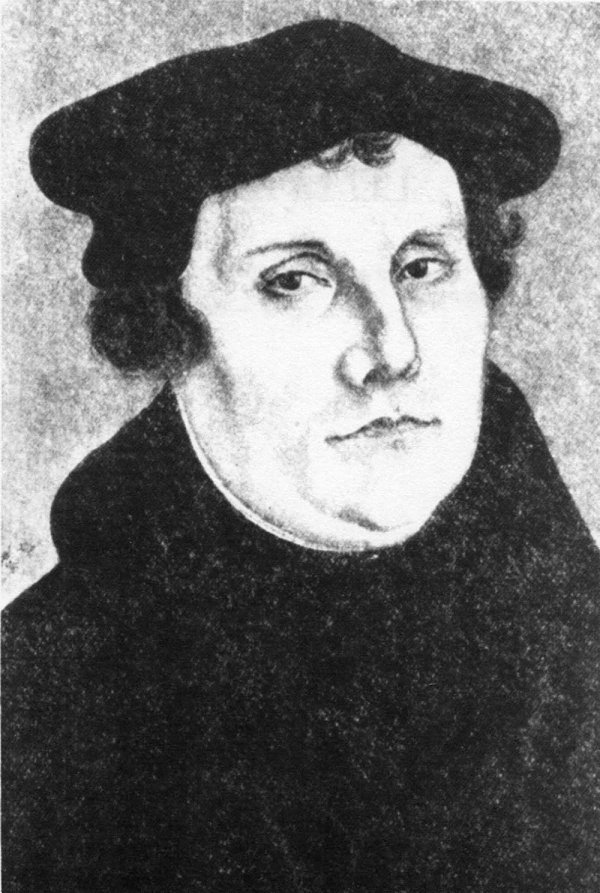
Martin Luther
14831546
The Founder of Protestantism
| Nihil Obstat: | Rev. Remy Lafort, S.T.D. Censor |
| Imprimatur: |  John Cardinal Farley John Cardinal FarleyArchbishop of New York New York, July 4, 1916 |
Originally published by Frederick Pustet Co., Cincinnati, Ohio, 1916. This edition was retypeset from Pustets revised edition and published in 1987 by TAN Books. Retypeset again by TAN Books in 2007.
Notes copyright 1987 by TAN Books.
Library of Congress Catalog Card No.: 87-50945
ISBN: 978-0-89555-322-5
The typography of this book is the property of TAN Books, and may not be reproduced, in whole or in part, without written permission from the Publisher.
Printed and bound in the United States of America.
TAN Books
Charlotte, North Carolina
www.TANBooks.com
2011
But though we, or an angel from heaven, preach a gospel to you besides that which we have preached to you, let him be anathema. As we said before, so now I say again: If any one preach to you a gospel, besides that which you have received, let him be anathema.
Galatians 1:8-9
Whosoever revolteth, and continueth not in the doctrine of Christ, hath not God. He that continueth in the doctrine, the same hath both the Father and the Son. If any man come to you, and bring not this doctrine, receive him not into the house, nor say to him, God speed you. For he that saith unto him, God speed you, communicateth with his wicked works.
2 John 1:9-11
I know that, after my departure, ravening wolves will enter in among you, not sparing the flock. And of your own selves shall arise men speaking perverse things, to draw away disciples after them.
Acts 20:28-30
Table of Contents
Preface
I T IS an accepted conclusion nowadays among the best students of the Protestant Rebellion of the sixteenth century that there are two Luthersthe Luther of panegyric, of romance, and fiction, and the Luther of history and fact. The former appears in the pulpit, in the Sunday school, and in partisan biographies; the latter may be discovered from a careful study of his writings and those of his contemporaries, but above all from his private letters, of which former devotees of Luther would only publish what they thought to his credit, garbling or suppressing the rest. These words, quoted from a rare little tract on Luther, written nearly thirty years ago by a prelate of the Church, who was one of the foremost Reformation scholars of that day, may well serve as the keynote of this present work with its powerful contrasts between the Luther of fact and the Luther of fiction. They also sum up the result of all the studies made in the life and works of Martin Luther since the last great international celebration of 1883the four hundredth anniversary of his birth at Eisleben. There are many who still remember the interest and zeal evidenced by the Protestant churches throughout Christendom when that fourth centenary was given a worldwide recognition. It was a celebration with far-reaching effectswith fatal effects, indeed, for the hero worship so dear to Luthers followers. In Germany, especially, scholars and publishers vied with one another in acclaiming him as the man to whom the modern world owed most, if not all, of its present liberty. He was hailed as the restorer of the truer evangelical life, as the spiritual liberator of the human race; and from that time down to the present, no ordinary reader has been able to keep pace with the output of Lutheran literature.
Probably no man ever lived about whom so much has been written as Luther, but it is from the last notable Luther celebration of 1883 that we can date the foremost works which have appeared on the subject. Today no important source on Luthers life and works remains unpublished. The Weimar Edition of his works, the typical edition, began to appear in 1883. Most of the Protestant authors, from whose works Monsignor OHare takes his quotations, have written since that date: Kstlin, Kawerau, Paulsen, Kolde, Hagen, Hausrath, Beard and others, have all written under the impulse of the Luther revival of thirty odd years ago. Throughout the whole period of this activity, the Luther of fiction and the Luther of historic fact have come boldly into conflict, and scholars know with what deplorable results for the heresiarch of Protestantism. But the ordinary man-in-the-street, for whom this volume is particularly designed, is still unaware of these revelations.
Throughout the whole period of this activity, the Luther of fiction has been relegated to the realm of the unhistorical. Scholars can no longer satisfy themselves with the general platitude that the greatest achievement of the race to which he belonged and the most important event in history is the Protestant Rebellion of the sixteenth century. We can no longer hold in the face of what modern scholarship has brought to light since 1883 that Luthers rebellion was essentially the beginning of a new religious movement. The Protestant Rebellion marked no new stage in human progress; it did not close the eyes of a dying medieval Church; it marked no new dawn of the modern era. Protestant scholars of repute no longer hold out to their disciples the old misconceptions that the Rebellion in Germany secured greater purity and spirituality in religion. It did not contribute, as we have been told so often, to the elevation of the laity and to the advancement of woman. It did not fashion a separation of secular from ecclesiastical power. It gave no extraordinary impulse to literature or to science. It did not establish liberty of conscience. In a word, it had nothing in its principles or methods which was to ennoble our modern civilization.
These truths have been self-evident to scholars the past twenty-five years. Like all corporate bodies built on error, the Lutheran Church of the sixteenth century has fared badly under the piercing light of modern research, and Luther himself has become more and more remote from all those characteristics of modern civilization to which his followers lay claim as the legacy of his apostasy. Protestant scholars in America, England and Germany have made plain that Luthers idea of God is repugnant to our natural feelings. Since the publication of Denifles works, the suite of events in Luthers apostasy has had to be changed; and we see at last that the furthermost point backwards to which his cleavage from the Church can be traced is not opposition to the Papacy, but the false idea, which seems to have haunted him into obsessionhis total impotency under temptation. It was this negation of the moral value of human actions, this denial of ones ability to overcome sin, which led to his famous doctrine on the worthlessness of good works. The only hope he had was in a blind reliance on God, whose Son, Jesus Christ, had thrown around him the cloak of His own merits. From this starting point it was facilis descensus Averni [an easy descent to Hell].
Opposition to all good works, and in particular to monastic regulations and to indulgences, led to opposition to authority, episcopal and papal. Germany was politically ripe for revolt at that moment, and the union of the Empire and the Papacy made it impossible to distinguish the victims, once the national spirit was aroused. That Luther aided, and aided powerfully, in this opposition to the Holy Roman Empire of both Church and State is undeniable; but what Protestant scholars have denied in no uncertain terms is the long litany of triumphs accredited to the Luther of fiction. His greatest workthe translation of the Bible into Germanis openly called a plagiarism. The claim that he is the father of popular education is ridiculed by leading Protestant historians. His economic views are considered retrogressive, even for his own time. The assertion that he is the founder of the modern State is denied categorically by his latest non-Catholic biographer, who tells us that he preferred despotism to democracy and that he never doubted the right and duty of the State to persecute for heresy. The Luther of fiction is being more and more obscured by the Luther of fact. But it takes time for the conclusions of scholars to reach the multitude, and with very little limitation the old shibboleths of the middle nineteenth century are being repeated today in Lutheran pulpits, Sunday schools, and partisan biographies.
Font size:
Interval:
Bookmark:
Similar books «The Facts About Luther»
Look at similar books to The Facts About Luther. We have selected literature similar in name and meaning in the hope of providing readers with more options to find new, interesting, not yet read works.
Discussion, reviews of the book The Facts About Luther and just readers' own opinions. Leave your comments, write what you think about the work, its meaning or the main characters. Specify what exactly you liked and what you didn't like, and why you think so.

